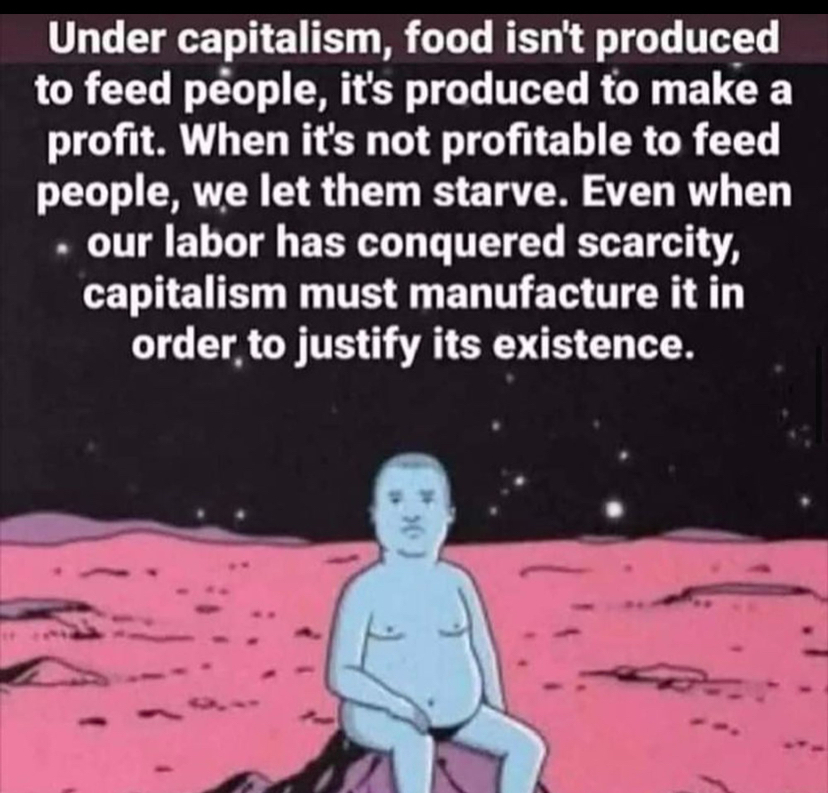Easy there OP, do you think food is some kind of "human right" or something? Before you know it, people will be saying housing is too.
Political Memes
Welcome to politcal memes!
These are our rules:
Be civil
Jokes are okay, but don’t intentionally harass or disturb any member of our community. Sexism, racism and bigotry are not allowed. Good faith argumentation only. No posts discouraging people to vote or shaming people for voting.
No misinformation
Don’t post any intentional misinformation. When asked by mods, provide sources for any claims you make.
Posts should be memes
Random pictures do not qualify as memes. Relevance to politics is required.
No bots, spam or self-promotion
Follow instance rules, ask for your bot to be allowed on this community.
In 2021, the United Nations General Assembly passed a resolution that everyone has a right to food and the UN should work to eliminate world hunger. It passed 186 for and 2 against. The two countries that disagreed were the United States and Isreal.
Not to defend them, but that only makes them less hypocritical than others. Talk (and UN resolutions) are cheap, and most countries don't guarantee food or shelter in practice. Finland is the only one that comes to mind as actually achieving this.
Edit: perhaps the downvoters would like to prove me wrong by providing their own examples?
There is a very logical progression of basic human needs. Without oxygen, a human will die in less than an hour. We need clean breathable air. Without water, a human a will die in less than a month. We need clean drinkable water. Without food a human will die in less than a year. Shelter is trickier because people can die of exposure and hypothermia in a matter of hours, but may be able to survive without it.
- Air for profit
- Water for profit <- This exists
- Food for profit <- We are here
- Shelter for profit
Minor correction: You're technically right, but you will die in less than a week without water and less than a month without food.
During the Great Depression the federal government literally paid farmers to not harvest crops because allowing that much food to be produced would dilute the market and bring down crop prices.
During the Great Depression.
A time when people were starving and there were virtually no forms of welfare.
When millions were thrust into poverty for reasons entirely out of their control.
The federal government paid farmers to create less food to protect profit margins.
Nowadays they largely pay for the food and give it to to people. We got gallons of eggs at one point from that.
Farmers have bills to pay, too. If the price of growing food doesn't cover the cost to make it they'll go out of business. Then there will be one less farm to grow food. If there's no farms and we're totally reliant on imports, that's a strategic weakness.
It's the same reason we prop up carmakers when they go out of business: Manufacturing capacity is a strategic asset just like farmland.
Then subsidize the farmers by the amount you were paying them to not harvest the food ? They don’t make any money when they aren’t selling it at all either, without this intervention…
Which leads to even cheaper food prices and even more subsidies, and then you have a planned economy.
Oh wait.
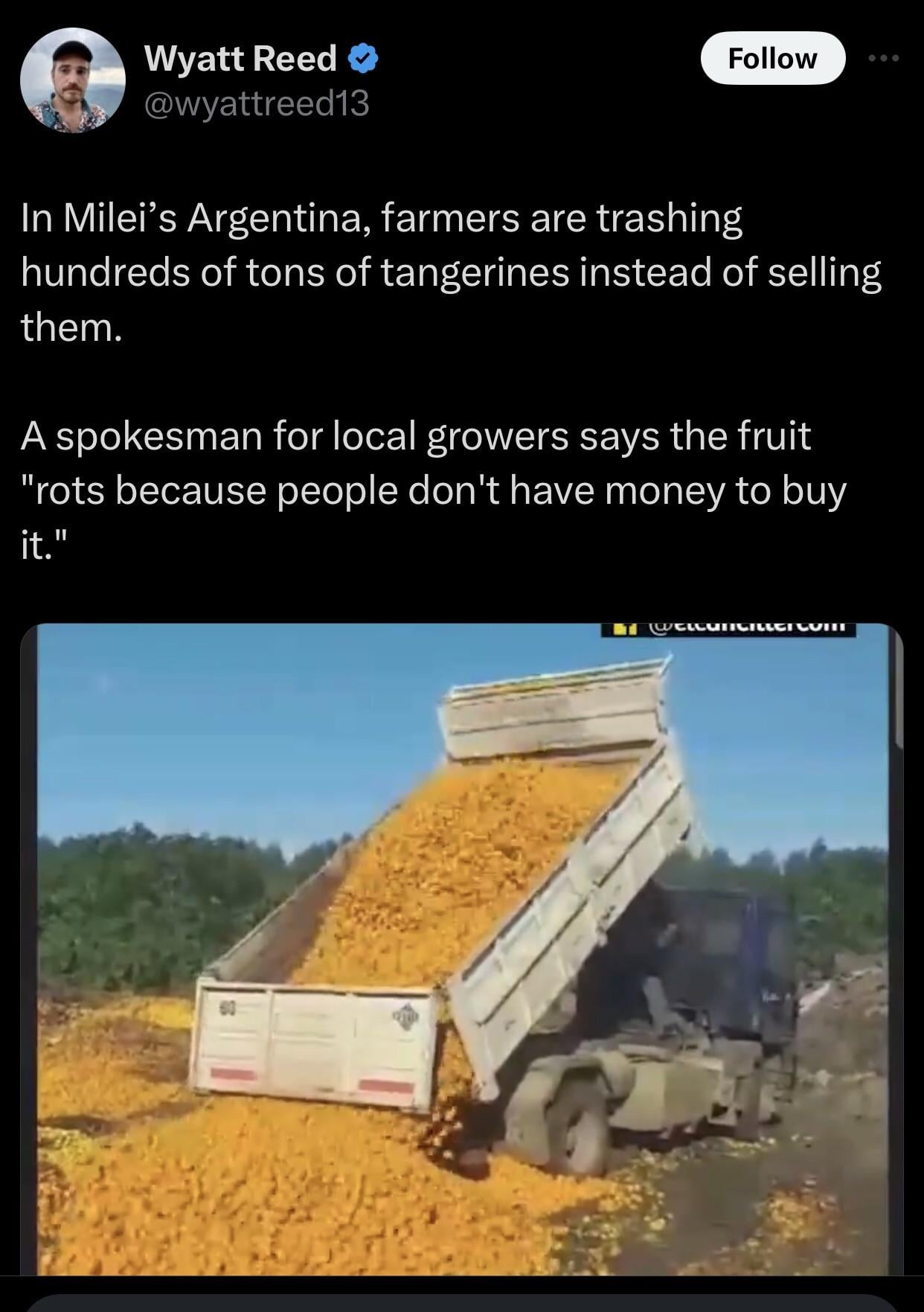
The reasons behind it are quite simple:
- Food spoils very quickly, so mostly if you don't consume it locally you need to quickly export which is quite expensive. Very often it's simply cheaper to utilize it for example as fertilizer.
- Storing food is costly.
- The best option would be not to produce an excess of food but 1) demand is hard to predict 2) crops output is hard to predict 3) for legal reasons like contractual obligations it's better to produce more than less.
- Current markets are hardly free: see https://www.history.com/news/government-cheese-dairy-farmers-reagan
In today's world every person who starves, who does without, who suffers unnecessarily..
Does so only because someone wants it so . Not because there is not enough
It was rather radicalizing finding out that the world makes three times as many calories per person than is necessary to feed every person on this planet, but because we're idiots living in a class society in the year 12024 HE, luxury restaurants regularly dump slightly subprime ingredients in the trash while thousands starve.
Does this statistic include calories fed to livestock or not?
This specifically talks about food.
According to health.com, the average person needs between 1600 to 3000 kilocalories a day depending on sex and age.
According to Our World In Data, even Africa, the continent with the least food reserves, has enough to give everyone roughly 2500 kcal, which ought to be more or less enough given how people with higher and lower caloric needs balance out. Seeing as how developed countries have more than enough, if a portion of that went to Africa and Asia, everyone could eat.
Calories are a rough measure, and according to Bahadur et al. we are overproducing grains but underproducing fruits, but the wretched of the Earth and the prisoners of starvation are not even getting that grain.
Edit: I have been informed that "calories" in nutrition are in fact "large-C calories", A.K.A. kilocalories. On the other hand, the OWiD numbers, which document the number of kcal available per day, still suggest that we have enough to feed everyone. I have altered the comment accordingly.
Small nitpick: When we talk about calories in food we actually mean kcal
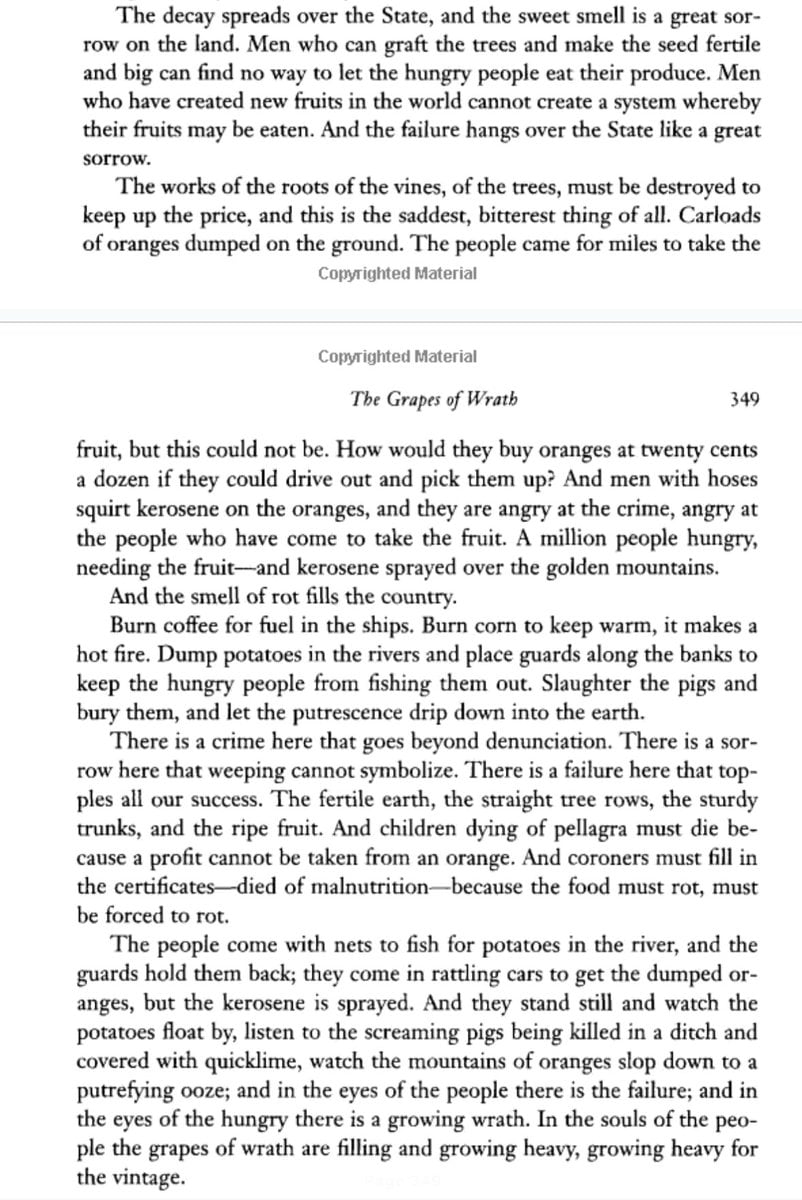
I seriously encourage everyone to read this book, even if you read it back in school and found it boring. It's incredibly topical to this day.
I also just read In Dubious Battle for the first time and recommend it. A great illustration on why it's so hard to get together and organize when it seems like it should be easy.
Existence is pain.
Schopenhauer was right even before the internet came :-)
It, unfortunately, is an efficient distribution of labor, at least relative to other systems. Not because wasting food for profit isn't fucking heinous, but because the mobility of investor capital and responsiveness of market prices is less inefficient than reciprocal economies or central planning.
However, we are at a point in human society where raw efficiency is no longer the bottleneck for our quality of life. Capitalism was an ugly solution to a real problem, but we can probably bid it farewell at this point, if only we can dislodge the elites who benefit from perpetuating it.
All we need is something that could realistically replace it, and a complete rewriting of all of our laws to allow for it to happen.
Easy enough.
Market socialism, ez. Shame about the whole "entrenched powers that be" bit.
Seems like you could get most of the way there by just keeping the current system but adding a social dividend which would form a basic income for everyone. If the dividend is pegged to economic growth then it should also be fairly resistant to inflation.
Seems like you could get most of the way there by just keeping the current system but adding a social dividend
And that loops back around to the "powers at be" problem.
We don't even need to go that far (although it would be nice). We could just make it illegal for stores to throw out perfectly good food and instead force them to donate it to food banks. They can even get a charity write-off as a treat.
The owner class will never willingly give up power, their actions are why capitalism is a religion.
Of course. Hence "dislodge" rather than "ask nicely".
I tend to lean more towards 'consume' and 'mulch', myself. Though I understand why others would find that distasteful.
Has to happen every few hundred years it seems, slave uprisings. When the owner class gets too fat and cruel towards the hands that make their wealth, those hands have to pick up some stones sometimes to remind them why noblesse oblige was once not considered optional.
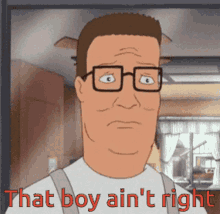
Damn it, ~~Bobby~~ Capitalism.
